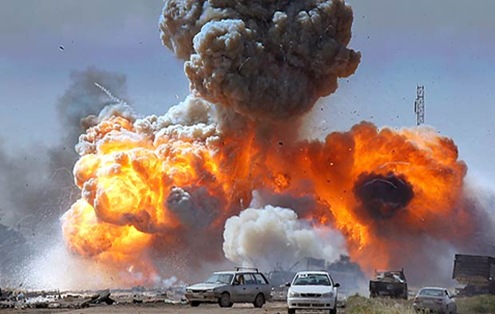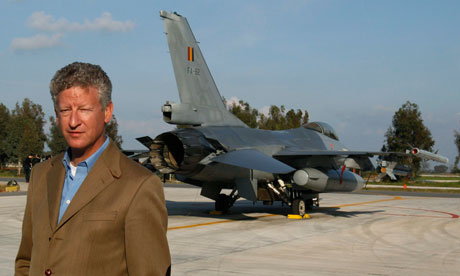By Peter Cary and Nancy A. Youssef | Center for Public Integrity and McClatchy Newspapers
WASHINGTON — In February 2006, with roadside bombs killing more and more American soldiers in Iraq, the Pentagon created an agency to defeat the deadly threat and tasked a retired four-star general to run it.
Five years later, the agency has ballooned into a 1,900-employee behemoth and has spent nearly $17 billion on hundreds of initiatives. Yet the technologies it's developed have failed to significantly improve U.S. soldiers' ability to detect unexploded roadside bombs and have never been able to find them at long distances. Indeed, the best detectors remain the low-tech methods: trained dogs, local handlers and soldiers themselves.
A review by the Center for Public Integrity and McClatchy of government reports and interviews with auditors, investigators and congressional staffers show that the agency — the Joint Improvised Explosive Device Defeat Organization — also violated its own accounting rules and hasn't properly evaluated its initiatives to keep mistakes from being repeated.
Meanwhile, roadside bombs remain the single worst killer of soldiers as more U.S. forces have been transferred out of Iraq and into Afghanistan. Known in military parlance as improvised explosive devices, the crude, often-homemade bombs killed 368 coalition troops in Afghanistan last year, by far the highest annual total since 2001, when the U.S.-led war there began, according to icasualties.org, which tracks military casualties in the Afghanistan and Iraq wars.
Among the serious questions about how well JIEDDO has spent its billions:
- The agency failed to collect data on its projects, leading a congressional investigative subcommittee to conclude in 2008, "The nation does not yet know if JIEDDO is winning the (counter-IED) fight."
- Some of its spending went to programs that had little to do with its core mission, including $400 million for Army force protection in 2010 and $24.6 million to hire private contractors for intelligence operations in Afghanistan.
- Agency officials misreported some $795 million in costs, the Government Accountability Office said, circumventing its own rules requiring high-level Defense Department approval for projects with price tags greater than $25 million.
- JIEDDO's staff comprises six contractors for every government employee, a ratio that its outgoing director acknowledged needs to be reduced.
- While the agency was mandated to "lead, advocate (and) coordinate" anti-roadside bomb initiatives, more than 100 groups and initiatives inside and outside the Defense Department continue "to develop, maintain and in many cases expand" their own work, the GAO found.
Rep. Duncan D. Hunter, R-Calif., a former Marine and an Iraq and Afghanistan veteran, said the Pentagon and its anti-IED agencies, including JIEDDO, could do far better in preventing casualties from roadside bombs.
"So as long as the IED metric keeps going up, and as long as we keep taking the majority of our KIA (killed in action) casualties from IEDs, then they've all been unsuccessful. Period," he said.
One U.S. soldier who was based in Baghdad in 2008 said: "We were out there every day. We studied our destroyed vehicles, and (the enemy's IED tactics) kept changing. So we kept trying new ideas, anything, to stop them. JIEDDO didn't help us." The soldier declined to be identified because of the sensitivity of the matter.
Lt. Gen. Michael Oates, who recently stepped down as the agency's director, its third in five years, acknowledged missteps but said they were inevitable because the agency was tasked with producing devices quickly.
"We fund things," Oates said. "Sometimes we fund things that don't work. Some call that waste; I call it risk."
One of the things that apparently didn't work was the Joint IED Neutralizer, created in 2002 by an Arizona start-up called Ionatron. Looking like a pair of boxy golf carts, the JIN fired ultra-short pulse lasers followed by a half-million-volt lightning bolt of electricity, and its makers said it could detonate the blasting caps that triggered IEDs from well outside blast range.
In 2005, then-Deputy Defense Secretary Paul Wolfowitz authorized $30 million for the JIN despite skepticism from scientists, who said damp ground or dust would render the device useless. During test runs in Afghanistan in 2006, the JIN was disappointing: It had trouble climbing steep mountain terrain and experienced safety problems, continuing to shoot lightning bolts after its switch was turned off.
After the JIN received some publicity, an insurgent website published ways to defeat it. The test vehicles were shipped back to the United States.
In mid-2006, shareholders filed two class-action suits against the JIN's makers, alleging that the firm had concealed the fact that the vehicle wasn't capable of meeting government specifications. The company, which had changed its name to Applied Energetics Inc., denied the claims but settled the suit in September 2009 by paying $5.3 million in cash and another $1.2 million in stock to the complaining shareholders. The firm didn't respond to repeated requests for comment.
Still, the project wouldn't die. With a $400,000 earmark from Sen. Thad Cochran, R-Miss., and $1.5 million more from JIEDDO, the Marine Corps hung the JIN on the front of a mine roller. A slide from a May 2009 Marine Corps briefing shows a device attached to mine rollers shooting a bolt of electricity into the ground.
"People have been trying to use a Tesla coil" — a transformer that can produce very high-voltage discharges — "for years to defeat mines. It has never worked," said Dan Goure, a former defense official who's a vice president at the Lexington Institute, a Washington-area research center.
The devices JIEDDO designed to detect roadside bombs at a distance didn't work out, Goure said. They included airplane- or drone-based radars, long-range radars to sniff out buried control wires, and detectors to sense explosive ingredients such as ammonium nitrate fertilizer.
Other projects that were started but abandoned include: Alexis and Electra-C, which emitted waves to detonate IEDs but interfered with jammers; an unmanned Humvee called Forerunner that soldiers said "induced operator vertigo" and was hard to control, according to a JIEDDO report; and a high-powered microwave emitter called BlowTorch that was designed to defeat heat-triggered IEDs but which insurgents figured out how to overcome.
"We were throwing new technologies into this like fast-food orders at a diner," Goure said.
JIEDDO officials said the agency quickly terminated programs that weren't promising. But the GAO and some congressional staffers countered that the agency has never been good at choosing or steering its projects.
"It's been a weakness from the beginning. They don't have good controls over start-ups," said Bill Solis, the director of defense capabilities and management at the GAO, which has authored several studies on the agency.
JIEDDO spent more than $3 billion on jammers to thwart radio-controlled IEDs, which most say was a good idea. It bought mine rollers to attach to the fronts of vehicles. However, critics note that what many consider the most successful anti-roadside bomb program was only marginally funded by JIEDDO: the Mine-Resistant Ambush Protected vehicle, now operating mainly in Afghanistan. While JIEDDO purchased the first 250 MRAPs, designed to withstand roadside bombs, it was a separate MRAP task force that bought more than 22,000 of them for $36 billion.
Oates, the agency's former director, has said the "greatest return on the dollar" has been training soldiers to detect and respond to roadside bomb attacks.
The GAO noted that the agency spent $70.7 million from 2007 to 2009 on "role-players in an effort to simulate Iraqi social, political and religious groups" at Pentagon training centers.
At one training site, the agency spent $24.1 million to make steel shipping containers resemble Iraqi buildings.
"I just couldn't believe it," said a former congressional staffer, who spoke only on the condition of anonymity because of a lack of authority to speak publicly.
The agency's new director, Lt. Gen Michael Barbero, took over earlier this month fresh off a tour in Iraq. Among his tasks will be collecting data on what works and what doesn't, and improving relations with Congress, which had complained in the past about a lack of information to evaluate the agency's performance.
In debate over the 2010 Pentagon budget, for instance, the House Armed Services Committee threatened to withhold half the agency's money "until the committee is provided JIEDDO's detailed budget and program information."
Few in Congress wanted to be seen giving short shrift to the fight against roadside bombs, however. Year after year, the agency has received the federal funding it requested, to the tune of $20.8 billion over six years.
Roadside bomb attacks continue to increase in Afghanistan, averaging roughly 1,500 per month at the end of last year. The number of U.S. troops wounded by IEDs skyrocketed to 3,366 in 2010, compared with 2,386 during the previous nine years combined, according to data JIEDDO collected.
Despite years of effort, soldiers have long had only a 50-50 success rate in detecting bombs before they explode. That ticked up to 60 percent in Afghanistan in recent months, Oates said — thanks largely to better local intelligence and aerial surveillance as well as on-the-ground technology — but it's too soon to tell whether this marks a long-term trend.
The agency's future is unclear. While some of Oates' predecessors argued that the agency should be a permanent part of the Pentagon because the fight against roadside bombs is global and ongoing, some in Congress have argued that it should be terminated at the end of the wars in Iraq and Afghanistan.
Oates, for his part, said that JIEDDO "is not a permanent organization, and we do not seek to be one."
(This article was reported and written by Peter Cary of the Center for Public Integrity and Nancy A. Youssef of McClatchy. Shashank Bengali of McClatchy contributed. The center is a nonprofit investigative journalism organization based in Washington. Cary is a freelance writer who formerly headed the investigative reporting team at U.S. News & World Report.)
Read more: http://www.mcclatchydc.com/
 Il piombo fuso per il petrolio
Il piombo fuso per il petrolio
